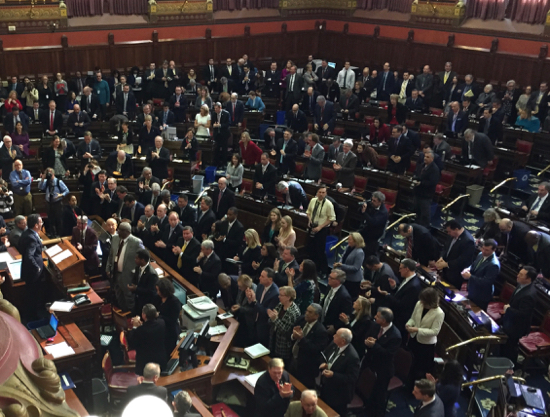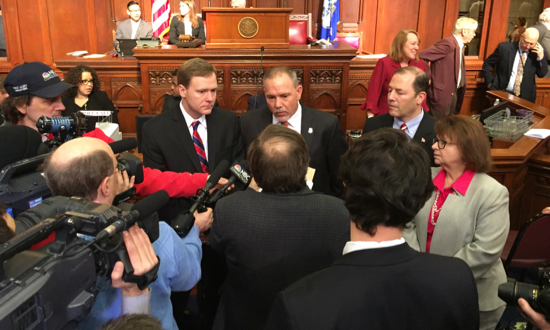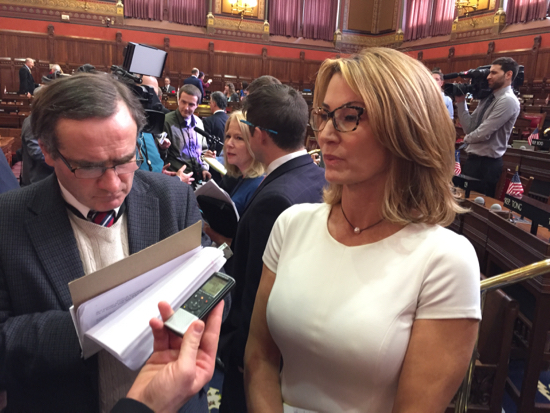 Gov. Dannel Malloy proposed a set of sweeping changes to the way the state funds local education that, if passed, would deliver millions more dollars in state aid to distressed communities like Ansonia and Derby.
Gov. Dannel Malloy proposed a set of sweeping changes to the way the state funds local education that, if passed, would deliver millions more dollars in state aid to distressed communities like Ansonia and Derby.
But do they have any chance of passing?
Some Background
Wednesday was a big day at the Capitol because Malloy unveiled a $40.6 billion two-year state budget.
Click here for an overview from the CT Mirror’s Keith Phaneuf.
The governor’s speech is a starting point.
It marks the beginning of months of legislative back-and-forth and proposals and counter-proposals as Democrats and Republicans try to hash out the state’s finances.
Most of the attention on Malloy’s address Wednesday focused on the roughly $1.5 billion in concessions he’ll be seeking from state employees to balance the books.
Malloy: ‘Fairer’ System Needed
But the governor also took aim at the way the state distributes money to its municipalities — particularly distressed communities like Ansonia and Derby.
Among other changes, Malloy is asking lawmakers to alter the way the state sends its “Education Cost Sharing” (ECS) grant to give more cash to poorer cities.
He’s also asking them to introduce a separate grant meant to defray local special education costs.
The results, if passed, would be a mixed bag in the Valley.
According to an analysis by the CT Mirror, under Malloy’s proposal Ansonia would receive about $3.7 million more, and Derby would get about $4.5 million more.
Officials in both cities have for years complained that the state isn’t fulfilling its obligations with respect to funding education. In fact, Ansonia is now considering scaling back its library hours, among other measures, to deal with escalating costs.
Click here to read a previous story about Ansonia officials highlighting the problem.
But at the same time, the governor’s proposal would result in the relatively more affluent communities of Shelton and Seymour losing about $5.5 million and $700,000, respectively.
Click here to see all the town aid numbers from the governor’s proposal.
Will It Pass?
Malloy’s proposal is just that — a proposal, for state lawmakers to act on.
Traditionally, the governor’s budget speech is a place were many well-intentioned ideas often appear but then ultimately fall by the wayside.
Example — Malloy’s predecessor, M. Jodi Rell, repeatedly called for the elimination of the local property tax on automobiles.
Yet we still pay car taxes every year because politicians deal-making over the budget focused on what they saw as more important priorities.

Gentile, Klarides React
So after Malloy’s speech the Valley Indy asked the area’s most experienced lawmakers from each party — state Rep. Linda Gentile of Ansonia and state Rep. Themis Klarides of Derby — whether they thought their fellow lawmakers would be receptive to Malloy’s proposals to change education funding.
Gentile, a deputy speaker of the statehouse Democrats, first noted that Malloy’s budget proposal will soon be joined by separate proposals from the major political parties.
The devil is in the details.
“What happens is we take a little bit from each and hopefully the Republicans will be partners in it,” she said. “With regard to ECS and special education funding, yes, that would be a huge benefit to the city of Ansonia and the city of Derby. But again, we have to look at what those details are.”
She also noted that Malloy’s proposals included more oversight, in the form of a “Municipal Review Board” that would have the power to review municipal finances.
“I would think fiscal conservatives would like the transparency of that and would like the accountability factor. And myself being a fiscal conservative I kind of like that,” Gentile said. “But … how much control to the local municipalities retain? I think it’s important that they retain some of that control.”

Klarides, the leader of the Republican minority in the state House of Representatives, was less charitable.
“I believe that there needs to be a reform of ECS,” she said. “We’ve all talked about that for years and years and we’re working on our proposals for it now too.”
Klarides’ 114th District spans Derby, a distressed community, and also Orange, a very wealthy suburb.
Of course the towns that are the worst off should get more from the state, she said. “It should be that way.”
That doesn’t mean the state should shut off the tap to richer towns, though.
“But if now we’re going to punish wealthier towns and give them nothing, then you know what? Don’t hold them accountable to unfunded mandates if they’re not going to get anything from the state,” Klarides said.